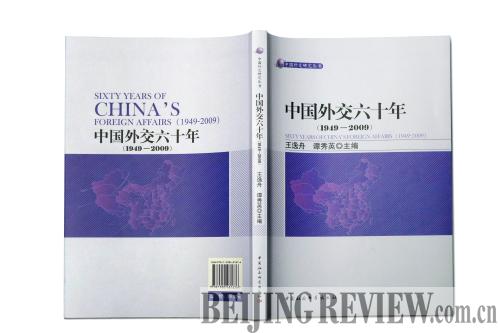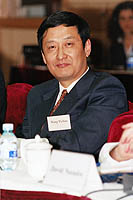| A prominent Chinese international relations scholar has explored and reviewed the history of Chinese diplomacy over the past 60 years, and has amassed some insightful views and incisive conclusions in his book Sixty Years of China's Foreign Affairs: 1949-2009.
Published in September by the China Social Sciences Press, this book is the second volume of a series, Chinese Diplomatic Studies. It not only analyzes the evolution of Chinese diplomacy over the past 60 years but also predicts what the future will hold.
Recently, Beijing Review reporters Ding Ying and Yu Yan spoke about the book with its editor in chief Dr. Wang Yizhou, who is also deputy director of the Institute of World Economics and Politics at the Chinese Academy of Social Sciences and a professor at the School of International Studies, Peking University.
 |
|
(WANG XIANG) |
Beijing Review: Since the founding of the People's Republic of China (PRC) in 1949, China's diplomatic environment and international status have been constantly changing. How many periods would you divide the 60 years of Chinese diplomacy? What are their features respectively?
 |
|
Wang Yizhou, Deputy Director of the Institute of World Economics and Politics, the Chinese Academy of Social Sciences (COURTSEY OF WANG YIZHOU) |
Wang Yizhou: In my opinion, the 60 years of Chinese diplomacy can generally be divided into two segments: the first 30 years—the era of Mao Zedong, and the last 30 years—the era of Deng Xiaoping.
In the time of Mao Zedong, the fundamental achievement of Chinese diplomacy was that China bade farewell to disunity and cast aside its image as being the "sick man of Asia." China, in effect, restored its national self-confidence politically, realized diplomatic independence and stood up in the international political arena as a big power.
Previously, China had always been dependent on stronger powers including Britain, the United States and Japan. Nonetheless, after the founding of the PRC, China realized a thoroughly independent diplomacy. Even beneath the overwhelming pressure of the Soviet Union, it refused to sacrifice political and diplomatic independence.
Moving forward, it should maintain the principles of full independence. Moreover, it should neither attach itself to any big power, nor enter into alliance with any big power or any political bloc.
Nevertheless, the Mao era also had its limitations. China failed to secure a path toward building a dynamic economy. In fact, this task remained unfulfilled until the era of Deng Xiaoping.
In the era of Mao, China was marginalized in the international economic system. Its diplomacy appeared unconventional and even somewhat rebellious. Of course, this was also due to the features of the international environment at that time.
The most significant achievement of the Deng Xiaoping era, of course, was that China discovered a path to build a dynamic, wealthy economy. Indeed, it was a dramatic change from a backward developing country to an emerging power.
If we compare it to scaling a mountain, China has ascended from a low-lying land and is now striving toward its peak.
Compared with its first 30 years, China's role in the international economic system has changed completely. It is now at its most open point and has surpassed all expectations. Indeed, China is the most promising among all the world's major economies.
On the other hand, Deng Xiaoping's policy also has its limitations. Compared with economic achievements, China's developments in other fields have proven relatively stagnant, including culture, provision of public goods, voice on the international stage and role in the formulation of international regimes on climate change, trade and polar and space exploration.
| 